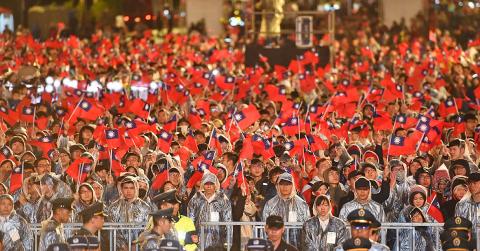President Tsai Ing-wen (蔡英文) yesterday proposed “four musts” as the basis for moving cross-strait relations in a positive direction, vowing to establish mechanisms to safeguard Taiwan’s national security.
China must recognize the existence of the Republic of China; respect the values of democracy and freedom Taiwan’s 23 million people hold dear; resolve cross-strait differences in a peaceful and equitable manner; and engage in negotiations with the government of Taiwan or an institution with a mandate from the government, Tsai said in her New Year’s Day speech.
These “four musts” are the vital basis for positive development of cross-strait relations, she said.

Photo: Liu Hsin-de, Taipei Times
The new formula appeared to be an attempt by Tsai to create a new starting point for relations with China, which have been at a standstill since her inauguration because of Beijing’s decision to cut off official communication with her administration.
It came one day before Chinese President Xi Jinping (習近平) is to deliver a speech on the 40th anniversary of a statement China first issued in 1979 that called for ending military confrontation with Taiwan and the opening of talks with Taiwan on expanding cross-strait exchanges.
Tsai yesterday rejected the view that the Nov. 24 elections, in which her Democratic Progressive Party (DPP) suffered stinging losses, were a rejection of her administration’s cross-strait policy.

Photo: CNA
The DPP administration was severely tested during the elections, but “I must emphasize that the election results absolutely do not mean that grassroots public opinion in Taiwan favors abandoning our sovereignty, nor do they mean that the people want to make concessions regarding Taiwanese identity,” Tsai said.
A drastic shift in the local political landscape after the elections has led the Chinese Nationalist Party (KMT) to push for cross-strait exchanges at the local government level based on the so-called “1992 consensus,” a format endorsing the “one China” principle that the Tsai administration has rejected.
Taipei Mayor Ko Wen-je (柯文哲) had reiterated at the Taipei-Shanghai forum last month his position that “the two sides of the Taiwan Strait are one family.”
Apparently referring to those positions, Tsai said that her administration was not opposed to normal cross-strait interactions or city-to-city exchanges, but that such exchanges would require the two sides to have a more realistic understanding of each other, including of the fundamental differences in their values, ways of life and political systems, so they can interact with each other in a healthy and normal manner.
China has been taking advantage of the openness and freedom of Taiwan’s democratic system to intervene in local politics and the development of society, but her administration would establish three mechanisms to ward off such threats, Tsai said.
The first would protect the livelihoods of Taiwanese, the second would enhance the nation’s national defense capability and the third would boost oversight and regulatory mechanisms for cross-strait interactions on issues that could compromise the nation’s sovereignty so as to consolidate its democracy, she said
Prior to her speech, Tsai attended a New Year’s flag-raising ceremony in front of the Presidential Office Building in Taipei.
Vice President Chen Chien-jen (陳建仁), Premier William Lai (賴清德), Legislative Speaker Su Jia-chyuan (蘇嘉全) and Taipei Mayor Ko Wen-je (柯文哲) were among the officials who participated in the ceremony — themed “Brave and Confident: One With the World” — in a steady drizzle and chilly winds.
Five newly naturalized citizens were invited to lead in the singing of the national anthem: US-born basketball player Quincy Davis, who plays on Taiwan’s national team; Turkish-born TV host Ugur Rifat Karlova; Lily Yang (楊萬利), a Burmese of Chinese descent; Tran Ngoc Thuy of Vietnam; and physician Peter Kenrick from Australia.
Performers at the ceremony included the Taipei Municipal Jianguo High School marching band, the team that represented Taiwan at the World Cheerleading Competition and the Feather Art of Drum and Dance troupe. The marching band won gold at the World Association of Marching Show Bands in Taipei in August last year and finished in the top three in the previous three years, while the troupe won gold at the Asian Percussion Festival in Tokyo in July last year.
The Taipei Municipal First Girls’ Senior High School marching band and a military honor guard also performed, as did the New Taipei City Junior Chorus, which won a silver medal at the World Choir Games in South Africa in October last year.
Some protests were also spotted during the ceremony.
Members of the Tax and Legal Reform League donned yellow vests and held up banners as they called for tax reform, while two pro-Taiwanese independence supporters carrying a flag that read “Deng Nan-jung [鄭南榕] — Taiwan’s national father” at a designated protesting zone in front of Jingfu Gate (景福門) called for Tsai to step down.
Deng was a democracy pioneer who self-immolated in 1989 in defense of “100 percent freedom of speech.”

INVESTIGATION: The case is the latest instance of a DPP figure being implicated in an espionage network accused of allegedly leaking information to Chinese intelligence Democratic Progressive Party (DPP) member Ho Jen-chieh (何仁傑) was detained and held incommunicado yesterday on suspicion of spying for China during his tenure as assistant to then-minister of foreign affairs Joseph Wu (吳釗燮). The Taipei District Prosecutors’ Office said Ho was implicated during its investigation into alleged spying activities by former Presidential Office consultant Wu Shang-yu (吳尚雨). Prosecutors said there is reason to believe Ho breached the National Security Act (國家安全法) by leaking classified Ministry of Foreign Affairs information to Chinese intelligence. Following interrogation, prosecutors petitioned the Taipei District Court to detain Ho, citing concerns over potential collusion or tampering of evidence. The

‘FORM OF PROTEST’: The German Institute Taipei said it was ‘shocked’ to see Nazi symbolism used in connection with political aims as it condemned the incident Sung Chien-liang (宋建樑), who led efforts to recall Democratic Progressive Party (DPP) Legislator Lee Kun-cheng (李坤城), was released on bail of NT$80,000 yesterday amid an outcry over a Nazi armband he wore to questioning the night before. Sung arrived at the New Taipei City District Prosecutors’ Office for questioning in a recall petition forgery case on Tuesday night wearing a red armband bearing a swastika, carrying a copy of Adolf Hitler’s Mein Kampf and giving a Nazi salute. Sung left the building at 1:15am without the armband and apparently covering the book with a coat. This is a serious international scandal and Chinese

Seventy percent of middle and elementary schools now conduct English classes entirely in English, the Ministry of Education said, as it encourages schools nationwide to adopt this practice Minister of Education (MOE) Cheng Ying-yao (鄭英耀) is scheduled to present a report on the government’s bilingual education policy to the Legislative Yuan’s Education and Culture Committee today. The report would outline strategies aimed at expanding access to education, reducing regional disparities and improving talent cultivation. Implementation of bilingual education policies has varied across local governments, occasionally drawing public criticism. For example, some schools have required teachers of non-English subjects to pass English proficiency

TRADE: The premier pledged safeguards on ‘Made in Taiwan’ labeling, anti-dumping measures and stricter export controls to strengthen its position in trade talks Products labeled “made in Taiwan” must be genuinely made in Taiwan, Premier Cho Jung-tai (卓榮泰) said yesterday, vowing to enforce strict safeguards against “origin laundering” and initiate anti-dumping investigations to prevent China dumping its products in Taiwan. Cho made the remarks in a discussion session with representatives from industries in Kaohsiung. In response to the US government’s recent announcement of “reciprocal” tariffs on its trading partners, President William Lai (賴清德) and Cho last week began a series of consultations with industry leaders nationwide to gather feedback and address concerns. Taiwanese and US officials held a videoconference on Friday evening to discuss the